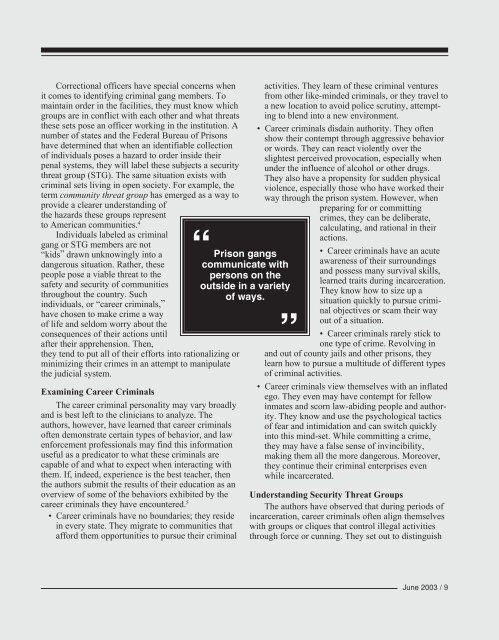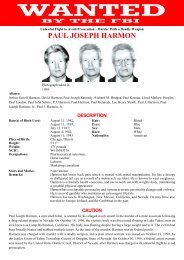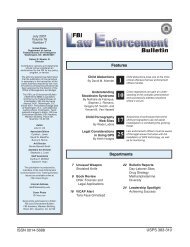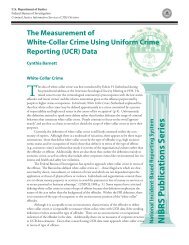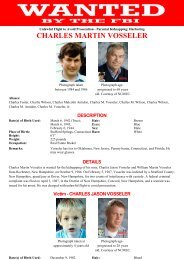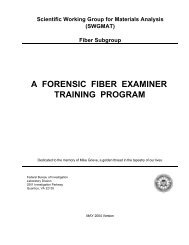F B I Law Enforcement Bulletin - June 2003 Issue
F B I Law Enforcement Bulletin - June 2003 Issue
F B I Law Enforcement Bulletin - June 2003 Issue
You also want an ePaper? Increase the reach of your titles
YUMPU automatically turns print PDFs into web optimized ePapers that Google loves.
Correctional officers have special concerns when<br />
it comes to identifying criminal gang members. To<br />
maintain order in the facilities, they must know which<br />
groups are in conflict with each other and what threats<br />
these sets pose an officer working in the institution. A<br />
number of states and the Federal Bureau of Prisons<br />
have determined that when an identifiable collection<br />
of individuals poses a hazard to order inside their<br />
penal systems, they will label these subjects a security<br />
threat group (STG). The same situation exists with<br />
criminal sets living in open society. For example, the<br />
term community threat group has emerged as a way to<br />
provide a clearer understanding of<br />
the hazards these groups represent<br />
to American communities. 4<br />
Individuals labeled as criminal<br />
“<br />
gang or STG members are not<br />
“kids” drawn unknowingly into a<br />
dangerous situation. Rather, these<br />
people pose a viable threat to the<br />
safety and security of communities<br />
throughout the country. Such<br />
individuals, or “career criminals,”<br />
have chosen to make crime a way<br />
of life and seldom worry about the<br />
consequences of their actions until<br />
after their apprehension. Then,<br />
they tend to put all of their efforts into rationalizing or<br />
minimizing their crimes in an attempt to manipulate<br />
the judicial system.<br />
Examining Career Criminals<br />
The career criminal personality may vary broadly<br />
and is best left to the clinicians to analyze. The<br />
authors, however, have learned that career criminals<br />
often demonstrate certain types of behavior, and law<br />
enforcement professionals may find this information<br />
useful as a predicator to what these criminals are<br />
capable of and what to expect when interacting with<br />
them. If, indeed, experience is the best teacher, then<br />
the authors submit the results of their education as an<br />
overview of some of the behaviors exhibited by the<br />
career criminals they have encountered. 5<br />
• Career criminals have no boundaries; they reside<br />
in every state. They migrate to communities that<br />
afford them opportunities to pursue their criminal<br />
Prison gangs<br />
communicate with<br />
persons on the<br />
outside in a variety<br />
of ways.<br />
activities. They learn of these criminal ventures<br />
from other like-minded criminals, or they travel to<br />
a new location to avoid police scrutiny, attempting<br />
to blend into a new environment.<br />
• Career criminals disdain authority. They often<br />
show their contempt through aggressive behavior<br />
or words. They can react violently over the<br />
slightest perceived provocation, especially when<br />
under the influence of alcohol or other drugs.<br />
They also have a propensity for sudden physical<br />
violence, especially those who have worked their<br />
way through the prison system. However, when<br />
preparing for or committing<br />
crimes, they can be deliberate,<br />
calculating, and rational in their<br />
actions.<br />
”<br />
• Career criminals have an acute<br />
awareness of their surroundings<br />
and possess many survival skills,<br />
learned traits during incarceration.<br />
They know how to size up a<br />
situation quickly to pursue criminal<br />
objectives or scam their way<br />
out of a situation.<br />
• Career criminals rarely stick to<br />
one type of crime. Revolving in<br />
and out of county jails and other prisons, they<br />
learn how to pursue a multitude of different types<br />
of criminal activities.<br />
• Career criminals view themselves with an inflated<br />
ego. They even may have contempt for fellow<br />
inmates and scorn law-abiding people and authority.<br />
They know and use the psychological tactics<br />
of fear and intimidation and can switch quickly<br />
into this mind-set. While committing a crime,<br />
they may have a false sense of invincibility,<br />
making them all the more dangerous. Moreover,<br />
they continue their criminal enterprises even<br />
while incarcerated.<br />
Understanding Security Threat Groups<br />
The authors have observed that during periods of<br />
incarceration, career criminals often align themselves<br />
with groups or cliques that control illegal activities<br />
through force or cunning. They set out to distinguish<br />
<strong>June</strong> <strong>2003</strong> / 9


